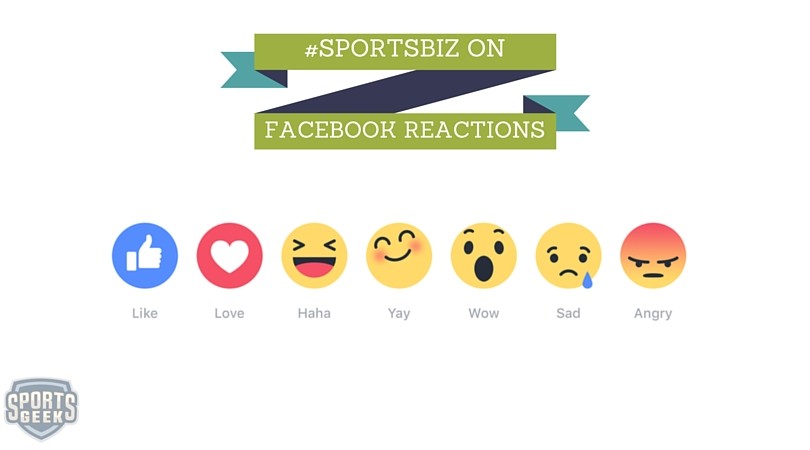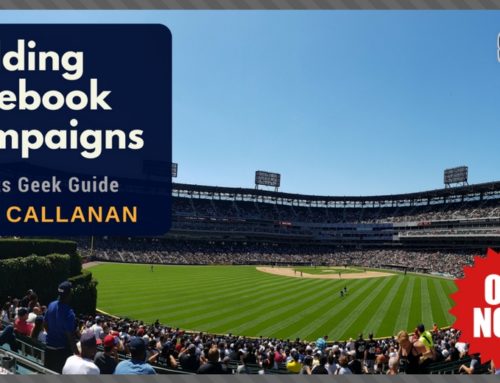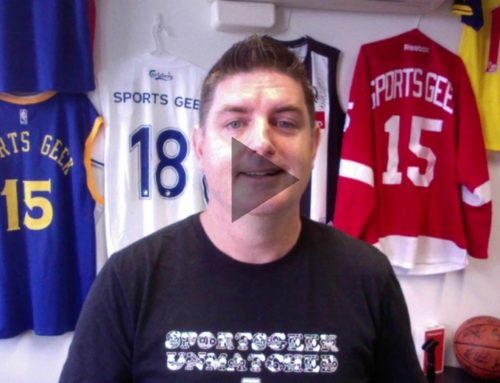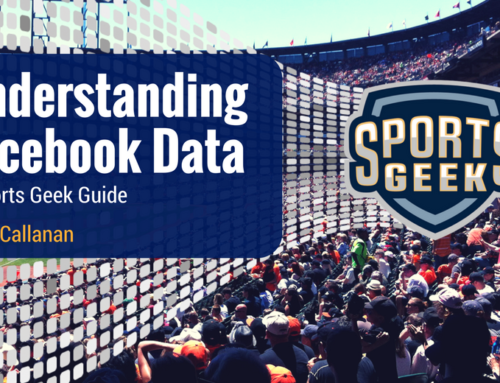The great thing about recording over 100 podcasts with #sportsbiz executives is getting to ask them what they think on sports digital trends. I asked a few former Sports Geek Podcast guests (and some future ones) about Facebook Reactions (now that the hysteria over a dislike button has died down). Here are their responses:
What is Facebook Reactions?
When talking about Facebook why not go straight to the source, Mark Zuckerberg.
Worth following for latest news and developments on Facebook as he announced Facebook Reactions on his Facebook page.
In case you didn't know this is what they are proposing to join Like:
- Love
- Haha
- Yay
- Wow
- Sad
- Angry
Funnily enough no DISLIKE button despite the media went into meltdown after Mark's Town Hall Q&A (watch it here he never said a dislike button was coming)
Meet the new Reactions.
Posted by Mark Zuckerberg on Thursday, October 8, 2015
What does #SportsBiz world think about Facebook Reactions?
Michael Rossi from Adelaide United
My simplistic take on this is that people are already using emojis anyway, across social and msg platforms so it makes sense that Facebook integrate it – they're just following and supporting existing user behaviour.
Fiona Green from Winners
Because I’m British, I’m looking at “haha” and wandering if it’s sarcastic or genuine: if it’s genuine, then there’s nothing that gives me a sarcastic or ironic response (probably not as important for the rest of the world?)
There are only 2 negative reactions out of the 7, probably by design, but what about “disappointed”, “embarrassed”, “waste of time” or even “dislike”?
For a business page, I’d value a reaction like “useful”
Listen to Fiona on Sports Geek Podcast
Dewayne Hankins from Portland Trailblazers
People naturally don’t like when things change but you can’t blame Facebook for wanting to evolve their platform. As a marketer it will be interesting to see if we’ll be able to market to fans based on which reactions they provide. Knowing Facebook, I’m sure that data will become available to us and that makes for even more customizable marketing opportunities. It also allows Facebook to update their platform and be included on the emoji craze. Makes sense to me.
Listen to Dewayne on Sports Geek Podcast
Brian Gibson from Digiviser (Formerly FFA & A-League)
What a great way to polarise the community! Something that Community Managers will needs to embrace.
Be interesting to see how these “stories” appear in your newsfeed.
Listen to Brian on Sports Geek Podcast
Shane Harmon from Westpac Stadium
I think Facebook Reactions will be very useful for teams in particular. They will provide an effective, simple (and free!) means of tracking fan sentiment around not just wins and losses, but also the type of content that teams are producing. I can envisage digital staff creating content to generate specific reactions. I very much look forward to seeing how creative teams will be with Facebook Reactions.
No doubt we’ll soon be reading who has the happiest, saddest or angriest fans! I look forward to it.
Listen to Shane on Sports Geek Podcast
Mike Donnay from Detroit Pistons
I'm intrigued by the additional dimension of insights we will be able to measure with the launch of reactions.
We've always evaluated the success of our content based on engagement – likes, comments and shares with a layer of context – positive, neutral and negative.
Reactions should naturally boost engagement across our content as fans are no longer limited to the like button.
How will fans react to the thrill of victory – like vs love or the agony of defeat – sad vs angry.
These new insights will play an important role as we refine our content plan and posting strategy this season.
Myles Harris from Melbourne Mustangs
All I see are stronger signals. I believe these will increase interaction on posts, simply because the ‘like’ button was strong positive signal, but was not catering to other feelings on it. I am looking forward to posting some humour and seeing the ‘haha’ or announcing something exciting and seeing the ‘yay’s. As a Facebook community manager and advertiser, these give me a lot more data on how we are engaging.
However I am most excited about Facebook’s new like buttons because it will lead to better targeted Facebook Advertising. ‘Love’ is a very strong signal to Facebook as is ‘angry,. This will better focus ad targeting, reduce ad spend and eliminate those caught up in some relational data issues.
Matthew Hagias from GWS Giants
It’s great Facebook is investigating new ways to freshen up its format however introducing emotional reaction buttons has the potential to reduce engagement when it comes to fans commenting on posts. At the GIANTS we encourage our members and supporters to engage with the club and share their opinions. We want to know WHY someone is upset, not just see that they ARE upset. My concern is these buttons will encourage people to simply click their emotion and not share the reason behind it which could ultimately detract from our engagement capabilities. We want people to speak to us, not just click a button to highlight their approval/disapproval.
Andi Perelman from Pittsburgh Penguins
I love them. I think it paints a much better picture about how your fans feel. I didn’t like the idea of a “dislike” button. It doesn’t tell the fan story. If we have a player injury, fans “dislike” that — but maybe the correct emotion is sadness or anger at how it occurred. “Dislike” is so vague. These new reaction options are much more thought out. I think there should be a “sympathetic/sorry” reaction too. I’m excited to see how our fans use it. If there is widespread adoption and we can see the emotions that are closely associated with our team and our content, it will be really beneficial.
Brendan Graham from Brisbane Lions
Interesting from a reporting standpoint, will bump up post engagement for a while. A little scary for teams when they lose.
Increases how ‘busy’ the Facebook experience is… feels a little MySpacey
Chris Freet from University of Arkansas
Facebook’s change to Reactions “emojis” is another example of the visual generation. All the emotions in the Facebook Reactions are already being conveyed through words in the comments section. My initial guess is Facebook believes the visual nature of the Reactions will speed up the timeline and lead to more scrolling. Or, and perhaps more likely, they believe emojis are a way to the reel the millennial demographic back to Facebook. If that is the case, you would think that Facebook would try out the Reactions on Instagram, where the demo skews far younger.
Listen to Chris on Sports Geek Podcast
Oscar Ugaz, formerly Real Madrid
Unfortunately the Reactions feature can be another gimmick that will distract marketers about what is really important in digital business: drive traffic to products, services or content that generates value to the users and the organisations that produce them.
In the last years we have focused on the likes race. Now we will worry about how many “love”, “haha”, “sad” or “angry” we obtain and we will use this as a measure of how good or bad we are performing . The rest of the sector will do the same: the average agency, consultant or expert will focus in techniques and recipes of how to obtain positive reactions instead of focus brain power in how to create objective value.
Reactions is a feature for the users to express certain types of feelings. As marketers we must use it as an indicator but not transform it in a disproportionate axis of our work.
Listen to Oscar on Sports Geek Podcast
John McCauley from OneUp Sports
Reactions on Facebook are long overdue … the data they will be collecting through this functionality will be the key to opening more monetization doors with advertisers.
Listen to John on Sports Geek Podcast
Kenton Olson from Seattle Seahawks
Only real thought now is if Facebook ever were to make it public and not just a test it will help make sentiment analysis much more reliable and streamlined. Sentiment tracking based upon comments is always very flawed and tough to look at as very reliable.
Listen to Kenton on Sports Geek Podcast
Andrew Nicholson from Sacramento Kings
I appreciate Facebook’s effort to provide a platform for its users to be more expressive and look forward to seeing how Reactions are adopted by Kings fans.
Listen to Andrew on Sports Geek Podcast
Richard Clarke from Colorado Rapids
Firstly, as a former fat bloke, it is nice to see…err….more well proportioned emojis. More seriously I think this will need to expand very quickly.
People will get bored immediately with the lack of breadth. The need to riff and innovative is more important than the movement IMO.
Listen to Richard on Sports Geek Podcast
Nate Flannery from NCAA
In my opinion, Facebook Reactions will give fans a simple way to engage with content on the platform in a more meaningful manner. The deeper level of emotion around posts should be valuable for content producers and brands.
Russell Scibetti from KORE Sports
Not a fan – sort of overlaps with the use of emojis and there is something simple and efficient about a Like. It actually may be more useful outside of sports when those emotions more directly translate to sentiment/engagement. For example, a fan could be sad that the team lost, but that's the emotion you want (vs. a fan of the opposition who is excited). It's going to blur the lines of what teams are trying to measure.
Listen to Russell on Sports Geek Podcast
Greg Oakford from Golf Victoria
My initial thoughts are positive towards Facebook reactions. I think it’s a natural progression to what we’ve already been seeing with emojis and animated GIF’s being used to communicate via traditional text and social platforms. The ‘like’ button has been a staple of Facebook for a long time now so I think freshening up a user’s mindset about their engagement with a post is a good thing. It’ll definitely be interesting to see how it plays out, especially with six new options. I could see the comments section potentially drying up initially as more cognitive effort will be required if a user is authentic in wanting to choose the correct reaction to what they’re viewing as they scroll down their feed.
At Golf Victoria, we’ll certainly trial a few pieces of content for the purpose of seeing whether our own views of what type of content it is matches with the reaction responses we drive. Incorporating the reaction emojis helps the user with context if we use the ‘sad’ reaction as an example. Not all pieces of content warrant someone to ‘like’ it, some are reporting some sad news, so as a user, being able to sympathise with the post through the sad reaction helps eliminate the confusion of the like button in this situation.
I’m just disappointed we haven’t seen the ‘poke’ brought back!
Listen to Greg on Sports Geek Podcast
Aaron LeValley from AEG (LA Kings & LA Galaxy)
No major reactions here – I think this is their way of realizing how consumers have embraced emoji’s and allow FB users to customize their posts to illicit more emotion.
Listen to Aaron on Sports Geek Podcast
Benjamin Stoll from FC Bayern
Facebook Reactions will offer a different and broader layer towards fan engagement as well as towards deeper options in terms of analytics in a more and more “emojinized world”. It will be interesting to see how Facebook will sort these new sentiment signals and how accurate respective analytics will be for sports organizations. Especially with negative sentiments. Possible “negative sentiment hackings” on a fanpage of a competitor page might be also a threats here. In general it probably will enrich the engagement perspective, but a broader choice does not always come with the rise of quality.
Bryan Srabian from San Francisco Giants
I’m very interested in the new Facebook reactions and think it opens up more engagement opportunities with our fans and perhaps a better way to measure fan sentiment.
Listen to Bryan on Sports Geek Podcast
Benjamin Goss from Stetson University
I'm conflicted about the new Facebook icons and believe it could either be a nice new wrinkle for them, or it may be much adieu about nothing.
The scientist in me knows that the opposite of “like” is “dislike.” However, the pragmatist in me knows that any such icon response to user-posted content would unleash a tremendous amount of social angst that would be worse than any viral plague, electronic or biological, that could be unleashed on the planet.
Keeping five of them positive was good, as was keeping the other two limited to at least somewhat impersonal emotions, at least within the context of responding to user-posted content.
Accordingly, I believe Facebook did the right thing in steering toward the icons they finally selected.
Also, I believe starting with a very few simple, basic emotions to expand beyond the basic “like” icon is probably also a smart thing to do. It was also smart to not try to reinvent the wheel, since Facebook users already use emoji in plenty of other media.
How practical these will be in analytic measurement terms remains to be seen. It could create an entirely new dimensions of analyzing data, or it could simply be re-plowing the same ground.
My guess is that it will indeed lead to richer data interpretation practices and provide insights not yet available.
Kate Orme from West Coast Eagles
With Facebook’s changes I imagine that I will be able to more quickly analyse our audience’s reception of our content in terms of sentiment. I anticipate that a wider variety of ‘quick emotional responses’ will reduce the number of comments on posts as fans are able to quickly share a variety of responses.
I would also anticipate the use of the emotions to be more popular for female users, with less popularity amongst our male and younger fans. I think females 35-55 will be the greatest users of the new emotions, with men increasing their use of the negative emotions when our team loses etc.
Jessica Smith from Under Armour
I'm a big believer that not all engagement is created equal. Fans might take action on a piece of content for a variety of reasons, and unless they comment, it's hard to dig deeper on the why behind their actions. The new Facebook reactions will give social media managers deeper insights into how fans actually react to their content and what type of emotion it evokes. Sure, the “angry” and “sad” buttons add a different level of transparency, but I think they should be embraced and not fretted. Sports evoke all kinds of emotions, as does our content. This is just another opportunity to dig down even deeper with our fans and build stronger connections. Leverage to analyze and understand the whys.
Dion Bennett from AFL (formerly Sports Geek)
Social media users are generally negative towards major changes, but Facebook had to continue to evolve and make more reactions available to people, and users love emojis so this change may be received more positively than changes in previous years. The emoji craze isn’t going away, so it’s smart for Facebook to get in on the action.
I’m interested to see how teams use them, because I think they benefit the most from the change. Gives them an easy way to track fan sentiment and offers the ability to create new and unique content for Facebook fans.
Scott Kegley from Minnesota Vikings
It’s going to be interesting to see how this change influences Facebook’s algorithm as it will certainly impact how brands and teams post. It also gives social media professionals a new toolkit and new opportunities to engage even further with fans. Whenever a change like this happens, you need to challenge yourself to come up with new, interesting and engaging ways to use the new features.
Personally, I like the new reaction. There are a wide range of emotional responses to posts other than a simple thumbs up. Now, people can respond as they see fit to posts by their friends, brands or teams. And the poster can more accurately gauge the response.
This is definitely something we’ll be taking full advantage of with the Vikings as we look to further enhance our fans’ experiences on our social accounts.
Listen to Scott on Sports Geek Podcast
David Warriner from Sydney FC
I think for football fans in general the new Facebook reactions will be a bonus. Supporters, Sydney FC fans especially, are very passionate people and during games they want lots of ways to express themselves and their feelings. The introduction of these new Facebook reactions will give them alternative and new ways to respond to the exciting and sometimes heart-breaking moments in our beautiful game.
Adam Bader formerly Real Madrid
Sports Geek Take
I'd like your reaction to Facebook Reactions, especially from the point of view of running a Facebook Page for a sports team or league.
I'll expand more on a future Sports Geek Podcast with my thoughts, but here are the burning questions for me:
- Will fans comment less if Wow, Yay or Angry is enough?
- Will edge rank be affected if you select Angry a lot? i.e. you'll see less posts
- Will you shy away from asking questions?
- Will the tone of posts change to entice certain reactions? e.g. Short sharp text with image to get Wows
- Will they even be implemented on Facebook Pages or do they only fit for personal status updates?
- Will Facebook Reactions help drag back engagement from younger audience?
- How will advertisers be able to leverage data from Facebook Reactions? (This is exciting as a marketer)
- How will sarcasm be measured, tracked or skew results?
Thanks to all who contributed to this article with their opinion.





